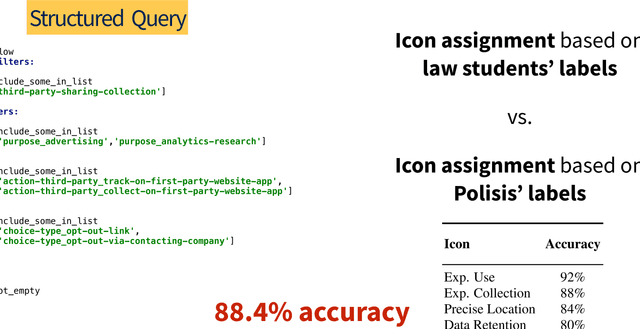Florian Schaub
Automated Detection and Analysis of Data Practices Using A Real-World Corpus
Feb 16, 2024



Abstract:Privacy policies are crucial for informing users about data practices, yet their length and complexity often deter users from reading them. In this paper, we propose an automated approach to identify and visualize data practices within privacy policies at different levels of detail. Leveraging crowd-sourced annotations from the ToS;DR platform, we experiment with various methods to match policy excerpts with predefined data practice descriptions. We further conduct a case study to evaluate our approach on a real-world policy, demonstrating its effectiveness in simplifying complex policies. Experiments show that our approach accurately matches data practice descriptions with policy excerpts, facilitating the presentation of simplified privacy information to users.
Polisis: Automated Analysis and Presentation of Privacy Policies Using Deep Learning
Jun 29, 2018

Abstract:Privacy policies are the primary channel through which companies inform users about their data collection and sharing practices. These policies are often long and difficult to comprehend. Short notices based on information extracted from privacy policies have been shown to be useful but face a significant scalability hurdle, given the number of policies and their evolution over time. Companies, users, researchers, and regulators still lack usable and scalable tools to cope with the breadth and depth of privacy policies. To address these hurdles, we propose an automated framework for privacy policy analysis (Polisis). It enables scalable, dynamic, and multi-dimensional queries on natural language privacy policies. At the core of Polisis is a privacy-centric language model, built with 130K privacy policies, and a novel hierarchy of neural-network classifiers that accounts for both high-level aspects and fine-grained details of privacy practices. We demonstrate Polisis' modularity and utility with two applications supporting structured and free-form querying. The structured querying application is the automated assignment of privacy icons from privacy policies. With Polisis, we can achieve an accuracy of 88.4% on this task. The second application, PriBot, is the first freeform question-answering system for privacy policies. We show that PriBot can produce a correct answer among its top-3 results for 82% of the test questions. Using an MTurk user study with 700 participants, we show that at least one of PriBot's top-3 answers is relevant to users for 89% of the test questions.
 Add to Chrome
Add to Chrome Add to Firefox
Add to Firefox Add to Edge
Add to Edge